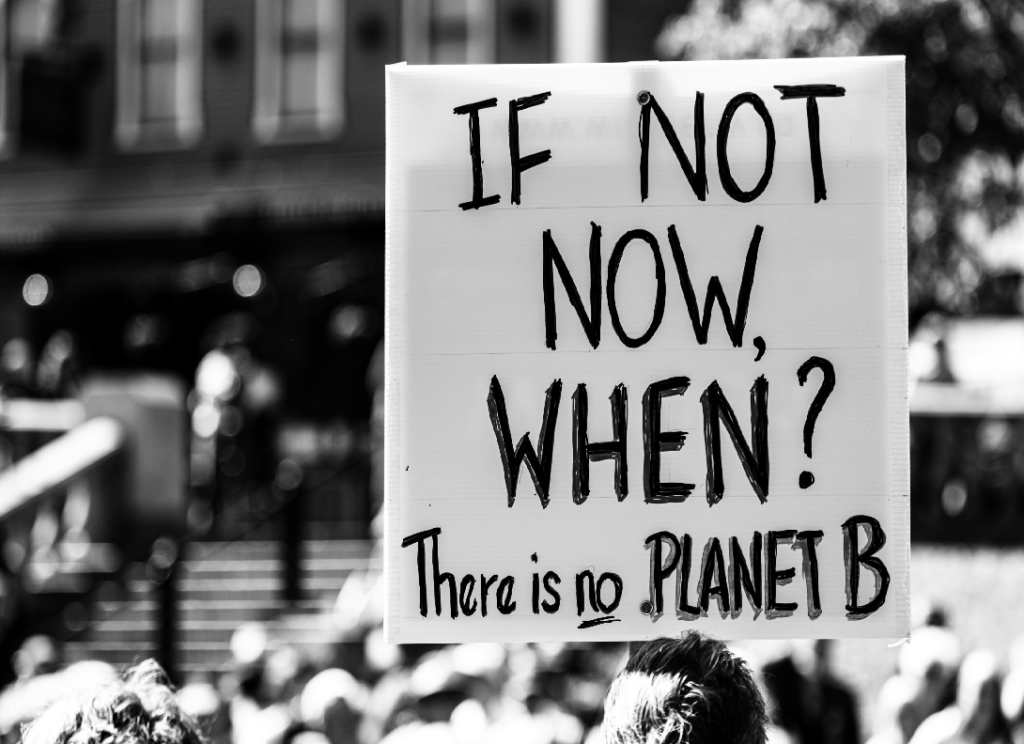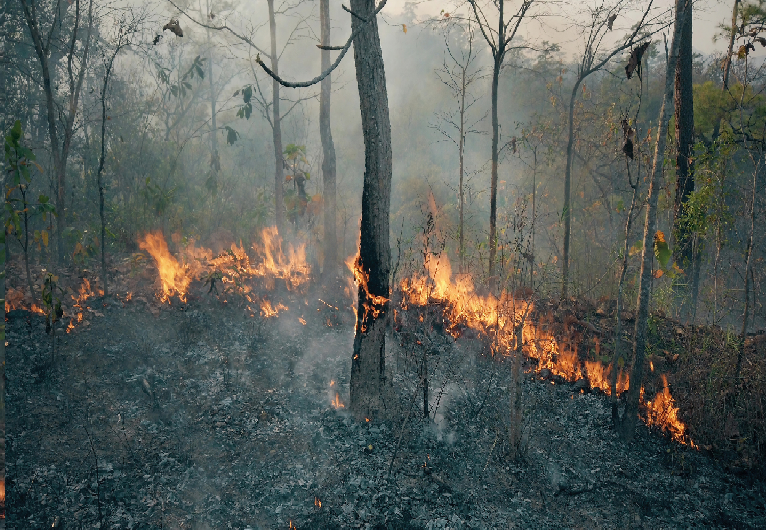By Steven George

The climate crisis keeps me up most nights. It occupies my thoughts persistently, and induces profound concern with climate-related matters, leading to intense emotional distress, sadness, and anger. I oscillate between feelings of hopelessness and experience a diminished interest and enjoyment in activities unrelated to climate and animal rights advocacy. I have to actively manage panic and anxiety attacks, depressive episodes, and there have been instances where I have felt physically ill due to the lack of action from global leaders. I genuinely fear for the most vulnerable populations on this planet. I fear for my generation as well as that of future generations. However, it also empowers me beyond measure.
The 1.5-degree of warming is a physical limit. Not a political target.
My experience is not uncommon. Those of us who have awakened to the reality of the urgent nature of this climate crisis can confirm the immense emotional toll it takes on us when we see a lack of leadership and inaction. The weight of this crisis is particularly felt by us younger generations who are actively fighting for own futures and facing a human extinction event. The current projections indicate a 66% likelihood of reaching a 1.5-degree increase in global warming by 2027. This alarming scenario carries a significant risk of triggering irreversible ecological tipping points, leading to an ecological collapse that would plunge billions into poverty with high risks of loss of life, and devastate local ecosystems, thus jeopardizing the habitats of our fellow earthlings with whom we share this planet.
From our generation’s perspective, this is the most important fight in human history. This decade will shape our future.
The 1.5-degree of warming is a physical limit. Not a political target.
GLOC2023 – Frustrations
The Global Space Conference on Climate Change (GLOC2023), aimed to unite the global space community to develop an effective climate response and contribute to the United Nations Conference of the Parties (COP28). It became evident from the outset that the conference had a strategic focus, with a predominant presence of leaders from the space industry rather than the workforce. The conference commenced with high-level plenaries featuring leaders from our space industry, who set the stage with inspiring words, assuring us that this event would not be, to quote Greta Thunberg, a mere repetition of empty rhetoric ‘Blah blah blah’. Although such promises have been made by global leaders in the past and have become somewhat cliché, their words were nonetheless encouraging and held promise for a meaningful conference.
Regrettably, I cannot provide a personal account of the delivery of this narrative, as my enthusiasm and hope gradually waned over the course of the conference. Several of our global space leaders departed midway through the conference, and the discussions appeared to be caught in a cycle of repetitive themes, echoing a self-congratulatory narrative. Moreover, the conference highlighted our unsuccessful attempts to deliver solutions to vulnerable communities, as Tom Gardner poignantly expressed on behalf of the Maldivian communities who were denied visas to attend. Quoting Tom, “international narrative met local reality” powerfully highlighted the stark contrast, shedding light on our own (developed world) arrogance and bringing it into sharp focus.
Additionally, Climate adaptation took centre stage, prioritizing the vital need to adapt to the changing climate. However, this emphasis seemed to promote a business-as-usual scenario within the Earth Observation (EO) community, without truly reflecting on how to significantly reduce emissions within the next five years to stay within the 1.5-degree physical limit, and within our planetary boundaries. It was disheartening to learn that 80% of the data generated goes unused (the number was mentioned in the first high-level plenary, but so far it has been difficult to find a reference to it), raising doubts about the investment in upstream activities, at least for this decade. In my mind, it questioned whether we should redirect our efforts this decade towards bridging the gap between data generation and its utilization by end-users.
From our generation’s perspective, this is the most important fight in human history.
Another frustration from my point of view was the catering. It is utterly absurd that we continue to serve animal products in settings such as climate conferences. This practice is akin to selling cigarettes at a lung cancer conference, considering the devastating impact that animal agriculture and our diets have on our planet. The conference’s catering choices were, without a doubt, the most disappointing aspect of the event, as it highlighted a dichotomy between an industry that advocates for saving the planet while showing no active interest in altering its practices to avoid contributing to the problem. Similarly, our industry, along with others, demonstrates a lack of willingness to modify its own behaviours and set a positive example, as demonstrated through our ongoing international travel, relentless pursuit of growth, heightened economic activities, and failure to address our unsustainable supply chains.
If I were to offer a descriptive name for the conference, I would suggest “Space for Climate Change” instead of “Space for Climate Action,” as it seemed to attract those who were merely “interested” in climate change rather than fostering a collective response to a global crisis. Allow me to emphasize the importance of the topic we are discussing for those who have remained engaged thus far. This is not a subject that people are merely “interested” in; it is a critical matter that demands our attention. If an asteroid were hurtling towards our planet, posing a threat to our very existence, we would mobilize tirelessly to find solutions. In times of war, we would allocate all available resources to protect ourselves. Why are we treating this planetary crisis any differently?

GLOC2023 – Encouraging takeaways
However, amidst the overwhelming background noise of repetitive rhetoric, there were a few individual voices that stood out. While my overall impression was one of disappointment, I must acknowledge the commendable leadership shown by the Norwegian Space Agency, as they truly rose to the occasion. Quantifying the overall net positive impact of this event would likely be challenging, considering the significant number of individuals who likely travelled by flight to attend. Nevertheless, this conference brought some added value, which was also summarized during the final summary plenary.
Improving Communication
This will be a hard pill to swallow for many of us. We are boring. While the topic of ‘Earth observation’ floods my brain with endorphins, dopamine, and adrenaline, the same cannot be said for our colleagues in telecommunications, navigation, and interplanetary missions, let alone the general public and various user communities. Regrettably, we have fallen very short in effectively conveying the significance of satellite data adoption for sustainability and climate response. This was a recurring theme of the conference that challenged people to confront an uncomfortable truth. We are exceptionally boring. However, it was refreshing and encouraging to witness Camille Bergin, a social media influencer, and Dr. Emma Gatti from Spacewatch.Global bravely bring this matter to our attention, fearlessly calling us all out. They have my utmost admiration for shedding light on this issue and giving us a direction forwards. We must learn how to communicate Earth Observations role more effectively.
Bridging the access gap to EO Products and services
A sense of deep disappointment washed over me upon hearing that a staggering 80% of the data generated by earth observation satellites goes unused. The veracity of this statistic remains uncertain, as I struggled to locate a definitive source to validate it, however, it led me to engage in introspection regarding my own involvement in upstream activities. It prompted me to question the relevance and value of my work within the context of immediate emissions reduction and long-term climate response strategies. Since joining the space industry, I have been closely observing the utilization and adoption of satellite data for various applications. Throughout this time, I have consistently questioned how such a substantial volume of data remains underutilized, resulting in a noticeable gap between data generation and its accessibility and exploitation by end-users. Attending this conference, which was specifically focused on space for climate action, further solidified my understanding that this problem is not merely a product of my own ignorance or lack of comprehension but indeed a genuine issue that needs to be addressed.
It wasn’t until the summary session that I discovered the number of guests invited by the IAF who had disregarded the event. The list included over 200 ministers and members of parliament. Initially, I recognized that the conference was confined within a “space bubble,” with discussions and presentations focused on work that we were already familiar with. I couldn’t help but wonder, where were the environmental lawyers, the policymakers, the finance industries, climate activists, and the communities most affected by climate change? It seems that the absence of these key stakeholders was not the fault of the conference itself but rather a communication issue. We, as a community, struggle to effectively communicate the crucial role of earth observation in policymaking. This realization became the most significant takeaway from the conference, emphasizing our collective responsibility to bridge the access gap to earth observation products and services. If not us, then who? If not now, then when?
Next-generation dialogue with our global leaders
During the summary session, IAF’s Executive Director Christian Feichtinger delivered inspiring and encouraging words, highlighting a clear lack of dialogue between older generations regarding solutions and the demands put forth by the younger generation. It was mentioned that when global space leaders were extended an invitation to join a dialogue with the next generation, it was met with apathy and disregard, reflecting a clear dichotomy. To address the climate crisis, we must prioritize inclusion and work towards bridging the intergenerational dialogue gap within the space and Earth observation community. As a representative of the younger generation, I can confidently assert our strong desire to actively participate in finding solutions. Being part of the collective efforts to resolve this crisis is of utmost importance to us, and it is disheartening when we are excluded from conversations or find it difficult to engage in a meaningful dialogue with our leaders.
What’s next?
Was the conference deemed successful? I personally feel that it did impact my journey in this fight. Some voices stood out, which gave me some hope. However, I must express my disappointment regarding the lack of urgency and insufficient focus on mitigation efforts, except for the remarkable work being carried out by GHGSat and MethaneSAT. The data they presented was exceptionally powerful, particularly in supporting disclosure practices and standards pertaining to environmental, social, and governance (ESG) factors, as well as its potential in climate litigation. To prevent this article from being purely cathartic, here are some thoughts on the areas that I believe should be prioritized. These thoughts are based on the findings of the UN IPCC Sixth Assessment Report (2022).
Tracking the low-carbon transition: How can earth observation products and services support and facilitate the transition from fossil fuels to renewables in the energy sector?
Transition of food systems: How can earth observation products and services support and facilitate the shift from animal agriculture to a sustainable plant-based food system?
Transition of urban and settlement systems: How can earth observation products and services monitor and provide insights on efficiency improvements achieved through better building insulation, reduced and cleaner energy consumption in buildings, electrification of public transportation, and other related aspects?
Returning with a multitude of ideas to pursue in the coming years, I’m reminded of a favourite quote from a technical session discussing the social, communications, economic, and cultural dimensions of environmental change:
‘There is nothing more powerful than an idea whose time has come’ – Victor Hugo
The opinions presented in this article are solely my own and do not represent those of ESA or any other organizations.

Steven George is an Earth Observation Technology and Systems Engineer at the European Space Agency (ESA) based in Noordwijk, Netherlands. He holds an MSc in Physics and an MSc in Astronautics & Space Engineering. Steven has a diverse background in volunteer work, including engaging in national student space initiatives, contributing to UN Volunteers mapping initiatives, and founding new initiatives and clubs. In addition, he participates in animal rights and climate activism. He endeavours to use his experience, time, and voice to bridge that gap between science, policy, and the public for an existence where humans, non-human animals, and the planet co-exist sustainability and in peace.
 SpaceWatch.Global An independent perspective on space
SpaceWatch.Global An independent perspective on space




